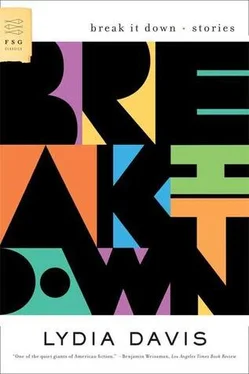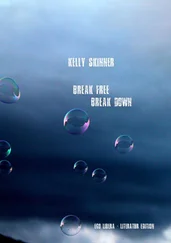The car is an old white Volvo; it has a beautiful soft shape. She sees other old Volvos nearly every day, and some are tan or cream-colored — close to the color of his — and some are his color, white, but undented and unrusted. The license plates never have a K in them, and the drivers, always in silhouette, are either women or men with glasses or men with heads that are smaller than his.
That spring she was translating a book because it was the only thing she could do. Every time she stopped typing and picked up the dictionary his face floated up between her and the page and the pain settled into her again, and every time she put the dictionary down and went on typing his face and the pain went away. She did a lot of hard work on the translation just to keep the pain away.
Before that, in late March, in a crowded bar, he told her what she was expecting to hear and what she dreaded hearing. Right away she lost her appetite, but he ate very well and ate her dinner too. He did not have the money to pay for the dinner and so she paid. After dinner he said, Maybe in ten years. She said, Maybe in five, but he didn’t answer that.
She stops by the post office to pick up a check. She is already late for where she is going, but she needs the money. She sees his handwriting on an envelope in her mailbox. Though it is very familiar to her, or because it is so familiar to her, she doesn’t know right away whose handwriting it is. When she realizes whose it is, she swears aloud over and over again walking back to the car. While she is swearing she is also thinking, and she decides that this envelope will have a check in it for some of the money he owes her. He owes her over $300. If he has been embarrassed about the debt, this would explain the year of silence, and if he now has some money to send her, this would explain the fact that now he is breaking the silence. She gets into the car, puts the key in the ignition, and opens the envelope. There is no check in it, and it is not a letter but a poem in French, carefully copied out in his handwriting. The poem ends compagnon de silence . Then his name. She doesn’t read all of it because she is late meeting some people she doesn’t know very well.
She goes on swearing at him until she gets to the highway. She is angry because he has sent her a letter, and because the letter has immediately made her happy, and then her happiness has brought back the pain. And she is angry because nothing can ever make up for the pain. Though of course it is hard to call it a letter, since it is nothing but a poem, the poem is in French, and the poem was composed by someone else. She is also angry because of the kind of poem it is. And she is also angry because even though later she will try to think of ways to answer this, she has seen right away that there is no possible answer to it. She begins to feel dizzy and sick. She drives slowly in the right-hand lane and pinches the skin of her neck hard until the faintness goes away.
All that day she is with other people and she can’t look at the letter again. In the evening, when she is alone, she works on a translation, a difficult prose poem. Her lover calls and she tells him how difficult the translation is but not about the letter. After she is finished working, she cleans the house very carefully. Then she takes the letter out of her purse and goes to bed to see what she can make of it now.
She examines first the postmark. The date and the time of day and the city name are very clear. Then she examines her name above the address. He might have hesitated writing her last name, because there is a small ink blot in a curve of one letter. He has addressed it a little wrong and this is not her zip code. She looks at his name, or rather his first initial, the G. very well formed, and his last name next to it. Then his address, and she wonders why he put a return address on the letter. Does he want an answer to this? It is more likely that he is not sure she is still here and if she is not still here he wants his letter to come back to him so that he will know. His zip code is different from the zip code of the postmark. He must have mailed this somewhere out of his neighborhood. Did he also write it away from home? Where?
She opens the envelope and unfolds the paper, which is clean and fresh. Now she notices more exactly what is on this page. The date, May 10, is in the upper-right-hand corner in a smaller, thicker, more cramped hand than the other writing on the page, as though he wrote it at a different time, either before or after the rest. He writes it first, then stops and thinks, his lips tight shut, or looks for the book he will take the poem from — though that is less likely, because he would have it ready in front of him when he sat down to write. Or he thinks after he is done that he will date it. He reads it over, then dates it. Now she notices that he has put her name at the top, with a comma after it, in line with his name below the poem. The date, her name, comma, then the poem, then his name, period. So the poem is the letter.
Having seen all this, she reads the poem more carefully, several times. There is a word she can’t decipher. It comes at the end of a line so she looks at the rhyme scheme and the word it should rhyme with is pures , pure (pure thoughts), so that the word she can’t read is probably obscures , dark (dark flowers). Then she can’t read another two words at the beginning of the last line of the octet. She looks at the way he has formed other capital letters and sees that this capital must be L, and the words must be La lune , the moon, the moon that is generous or kind aux insensés —to crazed people.
What she had seen first and the only words she could remember as she drove north on the highway were compagnon de silence , companion of silence, and some line about holding hands, another about green meadows, prairies in French, the moon, and dying on the moss. She hadn’t seen what she sees this time, that although they have died, or these two in the poem have died, they then meet again, nous nous retrouvions, we found each other again, up above, in something immense , somewhere, which must be heaven. They have found each other crying. And so the poem ends, more or less, we found each other crying, dear companion of silence. She examines the word retrouvions slowly, to make sure of the handwriting, that the letters really spell out finding each other again. She hangs on these letters with such concentration that for a moment she can feel everything in her, everything in the room too, and in her life up to now, gather behind her eyes as though it all depends on a line of ink slanted the right way and another line as rounded as she hopes it is. If there can be no doubt about retrouvions , and there seems to be no doubt, then she can believe that he is still thinking, eight hundred miles from here, that it will be possible ten years from now, or five years, or, since a year has already passed, nine years or four years from now.
But she worries about the dying part of it: it could mean he does not really expect to see her again, since they are dead, after all; or that the time will be so long it will be a lifetime. Or it could be that this poem was the closest thing he could find to a poem that said something about what he was thinking about companions, silence, crying, and the end of things, and is not exactly what he was thinking; or he happened on the poem as he was reading through a book of French poems, was reminded of her for a moment, was moved to send it, and sent it quickly with no clear intention.
She folds up the letter and puts it back in the envelope, lays it on her chest with her hand on top of it, closes her eyes, and after a while, with the light still on, begins to fall asleep. Half dreaming, she thinks that something of his smell may still be in the paper and she wakes up. She takes the paper out of the envelope and unfolds it and breathes deeply the wide white margin at the bottom of the page. Nothing. Then the poem, and she thinks she can smell something there, though she is probably smelling only the ink.
Читать дальше












